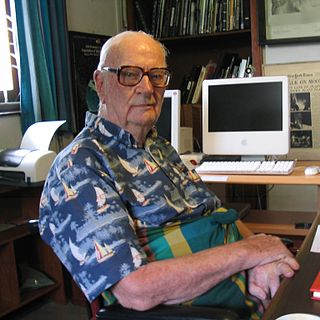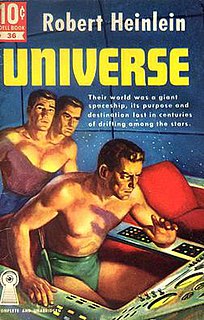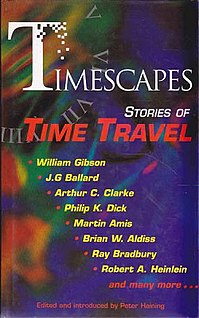
Hard science fiction is a category of science fiction characterized by concern for scientific accuracy and logic. The term was first used in print in 1957 by P. Schuyler Miller in a review of John W. Campbell's Islands of Space in the November issue of Astounding Science Fiction. The complementary term soft science fiction, formed by analogy to hard science fiction, first appeared in the late 1970s. The term is formed by analogy to the popular distinction between the "hard" (natural) and "soft" (social) sciences. Science fiction critic Gary Westfahl argues that neither term is part of a rigorous taxonomy; instead they are approximate ways of characterizing stories that reviewers and commentators have found useful.

Weird Tales is an American fantasy and horror fiction pulp magazine founded by J. C. Henneberger and J. M. Lansinger in late 1922. The first issue, dated March 1923, appeared on newsstands February 18. The first editor, Edwin Baird, printed early work by H. P. Lovecraft, Seabury Quinn, and Clark Ashton Smith, all of whom would go on to be popular writers, but within a year the magazine was in financial trouble. Henneberger sold his interest in the publisher, Rural Publishing Corporation, to Lansinger and refinanced Weird Tales, with Farnsworth Wright as the new editor. The first issue under Wright's control was dated November 1924. The magazine was more successful under Wright, and despite occasional financial setbacks it prospered over the next fifteen years. Under Wright's control the magazine lived up to its subtitle, "The Unique Magazine", and published a wide range of unusual fiction.
The BSFA Awards are literary awards presented annually since 1970 by the British Science Fiction Association (BSFA) to honour works in the genre of science fiction. Nominees and winners are chosen based on a vote of BSFA members. More recently, members of the Eastercon convention have also been eligible to vote.

Ballantine Books is a major book publisher located in the United States, founded in 1952 by Ian Ballantine with his wife, Betty Ballantine. It was acquired by Random House in 1973, which in turn was acquired by Bertelsmann in 1998 and remains part of that company today. Ballantine's logo is a pair of mirrored letter Bs back to back. The firm's early editors were Stanley Kauffmann and Bernard Shir-Cliff.

X Minus One is an American half-hour science fiction radio drama series that broadcast from April 24, 1955 to January 9, 1958 in various timeslots on NBC. Known for high production values in adapting stories from the leading American authors of the era, X Minus One has been described as one of the finest offerings of American radio drama and one of the best science fiction series in any medium.

Frank Belknap Long was an American writer of horror fiction, fantasy, science fiction, poetry, gothic romance, comic books, and non-fiction. Though his writing career spanned seven decades, he is best known for his horror and science fiction short stories, including early contributions to the Cthulhu Mythos. During his life, Long received the World Fantasy Award for Life Achievement, the Bram Stoker Award for Lifetime Achievement, and the First Fandom Hall of Fame Award (1977).
Martin Harry Greenberg was an American academic and speculative fiction anthologist. In all, he compiled 1,298 anthologies and commissioned over 8,200 original short stories. He founded Tekno Books, a packager of more than 2000 published books. As well, he was a co-founder of the Sci-Fi Channel. Greenberg was also a terrorism and Middle East expert. He was a long-time friend, colleague and business partner of Isaac Asimov.
The British Fantasy Awards are awarded annually by the British Fantasy Society (BFS), first in 1976. Prior to that they were known as The August Derleth Fantasy Awards. First awarded in 1972 only for novels, the number of award categories increased and in 1976 the BFS renamed them collectively the British Fantasy Awards. The current award categories are Best Fantasy Novel, Best Horror Novel, Best Novella, Best Short Story, Best Independent Press, Best Artist, Best Anthology, Best Collection, Best Comic/Graphic Novel, Best Non-Fiction, and Best Newcomer, while the Karl Edward Wagner Award for "important contribution to the genre or the Society" is given at the discretion of the BFS committee. The membership of the BFS vote to determine the shortlists of the awards, the winners being decided by juries.

Zima Blue and Other Stories is the first collection of short works by Alastair Reynolds. It was published in September 2006, by Night Shade Books. It includes ten stories, most of them long out of print. None of the stories in it are set in Reynolds's well-known Revelation Space universe, although Galactic North, a collection of most of Reynolds's Revelation Space short stories, was released soon after.
Everett Franklin Bleiler was an American editor, bibliographer, and scholar of science fiction, detective fiction, and fantasy literature. In the late 1940s and early 1950s, he co-edited the first "year's best" series of science fiction anthologies, and his Checklist of Fantastic Literature has been called "the foundation of modern SF bibliography". Among his other scholarly works are two Hugo Award–nominated volumes concerning early science fiction—Science-Fiction: The Early Years and Science-Fiction: The Gernsback Years—and the massive Guide to Supernatural Fiction.

Tales of Space and Time is a fantasy and science fiction collection of three short stories and two novellas written by the English author H. G. Wells between 1897 and 1898. It was first published by Doubleday & McClure Co. in 1899. All the stories had first been published in various monthly periodicals and this was the first volume to collect these stories.

The New Space Opera is a science fiction anthology edited by Gardner Dozois and Jonathan Strahan. It was published in 2007, and includes all original stories selected to represent the genre of space opera. It includes a five-page introduction, plus a brief introduction to each of the stories, and a dedication to Jack Dann. The front and back covers include endorsements by Orson Scott Card, Charles Stross, Joe Haldeman, Vernor Vinge, and Greg Bear. Ten out of the eighteen stories in the book were selected for the Locus recommended reading list for 2007.
Forbidden Planets (2006) is a science fiction anthology of all-new short stories edited by Peter Crowther, the fifth in his themed science fiction anthology series for DAW Books. The stories are all intended to be inspired by the 1955 movie, Forbidden Planet. The book was published in 2006.
Constellations (2005) is a science fiction anthology of all-new short stories edited by Peter Crowther, the fourth in his themed science fiction anthology series for DAW Books. The stories are all intended to be inspired by the theme of constellations. The book was published in 2005. The title page carries a subtitle, "The Best of New British SF".
Mars Probes (2002) is a science fiction anthology of mostly all-new short stories edited by Peter Crowther, the third in his themed science fiction anthology series for DAW Books. The one story that is the exception to appearing here for the first time is a reprint of a Ray Bradbury story from 1968. The stories are all intended to be inspired by the theme of robotic probes on Mars. The book was published in 2002.
We Think, Therefore We Are (2009) is a science fiction anthology of new short stories edited by Peter Crowther, the sixth in his themed science fiction anthology series for DAW Books. The main topic of the fifteen stories in the book is artificial intelligence. The introduction is written by Paul McAuley.

Tales in Time is an anthology of science fiction short stories about time, edited by Peter Crowther. It was first published as a trade paperback by White Wolf Publishing in April 1997. It was issued as a companion to Three in Time from the same publisher; the two books were followed up by a similar pair, Three in Space and Tales in Space, published in 1998.

Timescapes: Stories of Time Travel is an anthology of science fiction short stories on time travel edited by Peter Haining. It was first published in the United Kingdom hardcover by Souvenir Press in August 1997. The first American edition was issued in hardcover under the alternate title Time Travelers: Fiction in the Fourth Dimension by Barnes & Noble Books in 1998.













